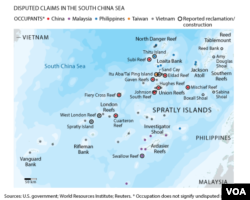At a time when China appears to be trying to smooth over its differences with rival claimants in the South China Sea, Indonesia has become the latest to indicate just how serious the situation has become.
Indonesia's security chief says the Southeast Asian country could become the second in the region to challenge China's claim to all of the South China Sea.
That is, if Beijing and Jakarta cannot resolve their territorial dispute through dialogue.
Dialogue First
Luhut Panjaitan said Wednesday that Jakarta is working hard on the issue and trying to approach the Chinese to discuss concerns about China's controversial territorial claims in the South China Sea.
"We would like to see a solution on this in the near future through dialogue, or we could bring it to the International Criminal Court," Luhut said.
Although he said the International Criminal Court, which deals with some of the world's most serious offenses such as war crimes, Luhut appeared to be referring to the international tribunal and its Permanent Court of Arbitration at the Hague.
The Philippines has already taken China to the international court, and the court recently ruled that it could hear some of the claims the Philippines has filed against China.
Nine-Dash Line
Beijing has flatly rejected the arbitration. China has long argued that disputes in the South China Sea should only be handled bilaterally and not through international intervention.
China claims almost all of the South China Sea is part of its territory and uses a so-called "nine-dash line" to outline its claims. The problem, however, is the line reaches well within the exclusive economic zones of several other countries in the region. In addition to Indonesia and the Philippines, Vietnam, Taiwan, Malaysia and Brunei all have overlapping claims with China.
An exclusive economic zone is an area at sea over which a country has special rights to resources exploration, according to the United Nations Convention of the Law of the Sea.
"We don't want to see any power projection in this area. We would like a peaceful solution by promoting dialogue,"Luhut said. "The nine-dash line is a problem we are facing, but not only us.”
China’s nine-dash line claim includes Indonesia’s Natuna islands.
APEC Issue?
The remarks from Luhut come just days before regional leaders meet in the Philippines for the Asian Pacific Economic Cooperation in Manila. China has already said it does not want the issue to be on the agenda at the meeting.
President Xi Jinping says he will still attend, despite Beijing’s ongoing dispute with the Philippines. And host Manila says it will not bring the issue up in the meetings. However, participants are likely to discuss the dispute on the sidelines of the talks, which are typically wide-ranging despite that the main focus of the meetings on trade and economic cooperation.
And while it is a security issue, it is not as if the disputed claims are unrelated to economics. Every year, the South China Sea sees more than $5 trillion in trade pass through its shipping lanes.
The United States recently carried out what it calls freedom of navigation mission sailing within the 12 nautical mile zone of artificial islands in the South China Sea that Beijing has been aggressively building up, constructing runways and raising concerns that their main use will be military. A concern China has repeatedly denied.
Charm Offensive
As the disputes grow and the United States pledges its patrols in the South China Sea will continue, Beijing has been stepping up efforts in recent weeks to cool the debate.
Daniel Chua, a research fellow at the S. Rajaratnum School of International Studies says since the ruling last month in favor of the Philippines, China has been on a charm offensive.
He says the charm offensive started with a proposal in mid-October to hold a maritime drill exercise with Southeast Asian nations in the South China Sea. Even President Xi’s historic handshake with Taiwan’s President Ma Ying-jeou last Saturday, the first meeting between the two leaders since 1949, was part of that offensive, he adds.
“These events seem to point to a more cooperative approach toward existing conflicts,” Chua says.
And China may have some more tricks in its bag.
Chua says while it may be a bit optimistic, there is a chance that during the APEC meetings China could “propose joint resource exploration in the South China Sea or they could even talk about ways the claimants could come together and not see this as a zero sum situation.” What Beijing could do instead, is focus on some common economic projects that could build confidence in the South China Sea.
Some material for this report came from Reuters






